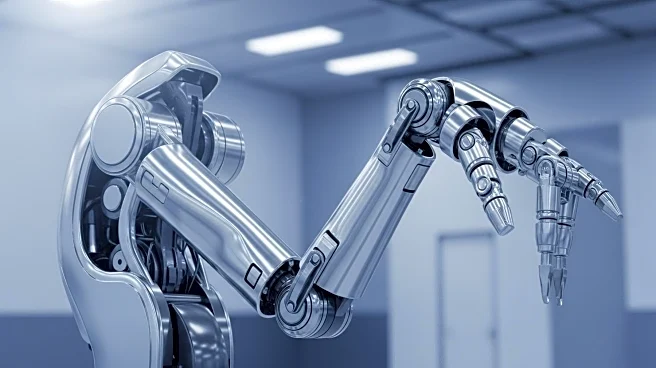What's Happening?
Güdel has introduced new collaborative robot technology at FabTech 2025, showcasing its CoboMover, a 7th-axis linear track designed for collaborative and lightweight robots. The CoboMover extends the working range of robots up to 5 meters, allowing them to operate multiple workstations without manual repositioning. Compatible with over 60 cobots and small traditional robots, the CoboMover offers mounting positions at 0° and 180° and supports a maximum payload of 78 kg. Güdel also demonstrated a modular track system with air bearings, enabling heavy robots to float into position on a cushion of air, addressing mobility and facility layout challenges.
Why It's Important?
The introduction of Güdel's collaborative robot technology represents a significant advancement in automation engineering. By expanding the range and flexibility of cobots, the CoboMover enhances productivity and efficiency in various industrial applications. The air bearing solution addresses mobility constraints in large workspaces, offering a novel approach to robot positioning without embedded tracks. These innovations are crucial for industries seeking to optimize operations and reduce reliance on traditional heavy machinery. Güdel's technology supports the growing demand for automation solutions that are adaptable to diverse manufacturing environments.
What's Next?
Güdel's collaborative robot technology is expected to drive further innovation in automation engineering. As industries continue to adopt cobots and lightweight robots, the demand for flexible and efficient automation solutions will increase. Güdel's engineering team is poised to develop additional products that address real-world challenges in automation, potentially expanding their offerings to new markets. The company's focus on precision and reliability will likely attract more integrators and end-users seeking advanced automation solutions.
Beyond the Headlines
The advancements in collaborative robot technology highlight the ongoing evolution of automation in manufacturing. As industries increasingly rely on cobots, considerations around workforce training and integration become important. Ensuring that workers are equipped to operate and collaborate with these technologies is crucial for maximizing their benefits. Additionally, the environmental impact of automation solutions, such as energy consumption and resource use, must be addressed to align with sustainability goals.










